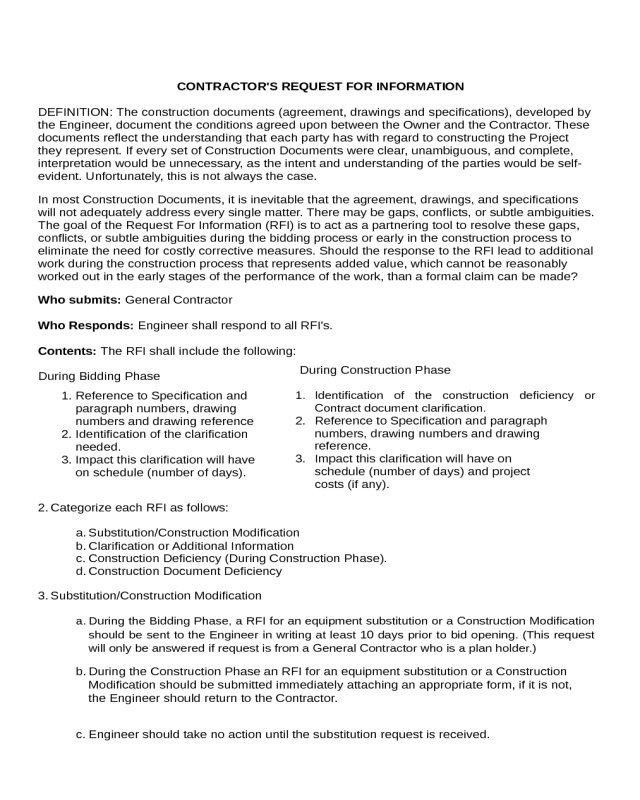Fillable Printable Contractor's Request for Information Template
Fillable Printable Contractor's Request for Information Template

Contractor's Request for Information Template

CONTRACTOR'S REQUEST FOR INFORMATION
DEFINITION: The construction documents (agreement, drawings and specifications), developed by
the Engineer, document the conditions agreed upon between the Owner and the Contractor. These
documents reflect the understanding that each party has with regard to constructing the Project
they represent. If every set of Construction Documents were clear, unambiguous, and complete,
interpretation would be unnecessary, as the intent and understanding of the parties would be self-
evident. Unfortunately, this is not always the case.
In most Construction Documents, it is inevitable that the agreement, drawings, and specifications
will not adequately address every single matter. There may be gaps, conflicts, or subtle ambiguities.
The goal of the Request For Information (RFI) is to act as a partnering tool to resolve these gaps,
conflicts, or subtle ambiguities during the bidding process or early in the construction process to
eliminate the need for costly corrective measures. Should the response to the RFI lead to additional
work during the construction process that represents added value, which cannot be reasonably
worked out in the early stages of the performance of the work, than a formal claim can be made?
Who submits: General Contractor
Who Responds: Engineer shall respond to all RFI's.
Contents: The RFI shall include the following:
During Bidding Phase
1. Reference to Specification and
paragraph numbers, drawing
numbers and drawing reference
2. Identification of the clarification
needed.
3. Impact this clarification will have
on schedule (number of days).
During Construction Phase
1. Identification of the construction deficiency or
Contract document clarification.
2. Reference to Specification and paragraph
numbers, drawing numbers and drawing
reference.
3. Impact this clarification will have on
schedule (number of days) and project
costs (if any).
2. Categorize each RFI as follows:
a. Substitution/Construction Modification
b. Clarification or Additional Information
c. Construction Deficiency (During Construction Phase).
d. Construction Document Deficiency
3. Substitution/Construction Modification
a. During the Bidding Phase, a RFI for an equipment substitution or a Construction Modification
should be sent to the Engineer in writing at least 10 days prior to bid opening. (This request
will only be answered if request is from a General Contractor who is a plan holder.)
b. During the Construction Phase an RFI for an equipment substitution or a Construction
Modification should be submitted immediately attaching an appropriate form, if it is not,
the Engineer should return to the Contractor.
c. Engineer should take no action until the substitution request is received.

d. Contractor shall identify the equipment substitution noting the specification or plan sheet
involved and the reason for the substitution. This would include schedule impacts and
costs.
e. Contractor shall identify the construction modification by detail and plan sheet location
they are considering. The construction modification request shall outline the change
requested in enough detail for the Engineer to review and the reasons for the change. Also
included would be schedule impacts and costs.
3. Clarification or Additional Information
a. Review the RFI request for completeness and return immediately if not complete.
b. Review the RFI request and respond with the appropriate clarification or additional information.
c. During the Construction phase, should the clarification or additions result in an impact
on schedule and project costs the Contractor will respond within 2 working days.
d. No work is authorized until both schedule and project costs are agreed to.
4. Construction Deficiency (During Construction Phase Only)
a. If the RFI is about a construction deficiency, then the Engineer should complete a
deficiency form and submit to the Contractor.
b. This effort should be completed as soon as discovered or as determined from the RFI.
c. The deficiency form should request a proposal from Contractor on how to correct the
problem.
5. Construction Document Deficiency
a. Review RFI for verification of deficiency.
b. Review RFI and respond with the proposed corrections to construction documents.
c. Contractor shall review schedule and cost impact within 2 working days. No work is
authorized until both schedule impact and project costs are agreed to.



